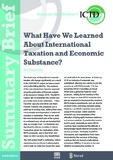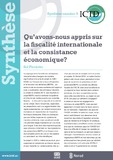What Have We Learned About International Taxation and Economic Substance?
Qu’avons-nous appris sur la fiscalité internationale et la consistance économique?
| dc.contributor.author | Picciotto, Sol | |
| dc.date.accessioned | 2018-01-23T13:43:05Z | |
| dc.date.available | 2018-01-23T13:43:05Z | |
| dc.date.issued | 2017 | |
| dc.identifier.citation | Picciotto, S. (2017) What Have We Learned About International Taxation and Economic Substance? ICTD Summary Brief 9, Brighton:IDS | en |
| dc.identifier.citation | Picciotto, S. (2017) Qu’avons-nous appris sur la fiscalité internationale et la consistance économique? ICTD Synthèses 9, Brighton:IDS | fr |
| dc.identifier.uri | https://opendocs.ids.ac.uk/opendocs/handle/20.500.12413/13499 | |
| dc.description.abstract | The landscape of international corporate taxation will change significantly as a result of the G20/OECD project on base erosion and profit shifting (BEPS). The contours of this new terrain have become apparent since the publication of the main outputs of the project in October 2015.The BEPS outputs aim to strengthen the system and give better tools to tax authorities – if they have the capacity and will to use them. Overall, however, the proposals are a patch-up of existing rules, making them even more complex and dependent on technical expertise to administer. They do not tackle the more fundamental flaws of the system in a coherent way, but are an important first step on a longer road. It is therefore very important for African countries to inform themselves about the implications of the BEPS proposals, and to form their own views on which aspects may benefit them. | en |
| dc.description.abstract | Le paysage de la fiscalité internationale des entreprises changera considérablement à la suite du projet G20 / OCDE sur l'érosion de la base d'imposition et le transfert des bénéfices (BEPS). Les contours de ce nouveau terrain sont apparus depuis la publication des principaux résultats du projet en octobre 2015. Les résultats du BEPS visent à renforcer le système et à donner de meilleurs outils aux autorités fiscales - si elles ont la capacité et la volonté de les utiliser. Cependant, en général, les propositions sont un patch-up des règles existantes, ce qui les rend encore plus complexes et dépendent de l'expertise technique à administrer. Ils ne s'attaquent pas aux failles les plus fondamentales du système de manière cohérente, mais constituent un premier pas important sur une route plus longue. Il est donc très important que les pays africains s'informent sur les implications des propositions BEPS et se forgent leur propre opinion sur les aspects qui peuvent leur être utiles. | fr |
| dc.description.sponsorship | Department for International Development | en |
| dc.description.sponsorship | Bill and Melinda Gates Foundation | en |
| dc.language.iso | en | en |
| dc.publisher | IDS | en |
| dc.relation.ispartofseries | ICTD Summary Brief;9 | |
| dc.rights | Attribution-NonCommercial-NoDerivs 2.0 UK: England & Wales | en |
| dc.rights.uri | http://www.ids.ac.uk/files/dmfile/IDSOpenDocsStandardTermsOfUse.pdf | en |
| dc.subject | Governance | en |
| dc.title | What Have We Learned About International Taxation and Economic Substance? | en |
| dc.title | Qu’avons-nous appris sur la fiscalité internationale et la consistance économique? | fr |
| dc.title.alternative | Taxation | en |
| dc.title.alternative | Economy | en |
| dc.title.alternative | International | en |
| dc.type | Series paper (IDS) | en |
| dc.identifier.externaluri | http://www.ictd.ac/publication/7-policy-briefing/174-ictd-sb9 | en |
| dc.identifier.team | Governance | en |
| rioxxterms.version | NA | en |


